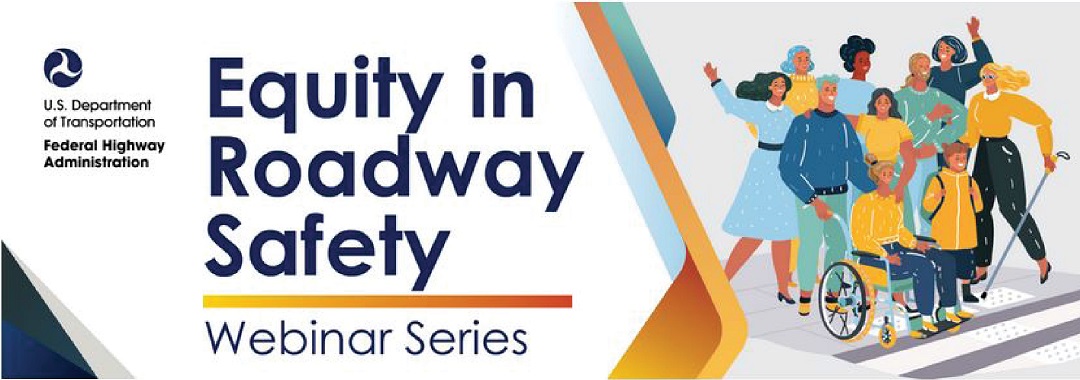Recorded Webinars
FHWA’s equity in roadway safety webinar series shares equitable strategies and tools that can be integrated into transportation programs and projects to close disparities in roadway fatalities on the way to our shared goal of zero deaths. Several recordings are available below.
Roadway Safety for People Experiencing Homelessness (September 4, 2024)
Passcode: =3HZ8x@Md
Description: Learn from Texas Department of Transportation’s Austin District, Hawaii Department of Transportation, and the City of San José, California about how they are implementing strategies to address the road safety needs of people experiencing homelessness, a population that experiences significant disparities in roadway fatalities, as part of their work to reach the goal of zero deaths.
Read the Case Study on Promising Practices to Address Road Safety among People Experiencing Homelessness. This Case Study highlights seven promising practices. Each one includes a description, suggested actions to implement the promising practice, and examples of how State and local transportation agencies are implementing them.
Equitable Data Analysis (May 22, 2024)
Passcode: =@k?D?6$
Description: Join us to learn about available tools to collect, analyze and visualize data to support safety and equity. This session features (1) a demo from NHTSA on the FIRST tool, which allows you to quickly and easily disaggregate crash fatality data by race, crash contributors, etc. and visualize these crashes and (2) presentations on the Syndromic Surveillance Program by the CDC and Washington State Department of Health which allows you to potentially access real-time data on serious injury for pedestrians from emergency departments.
Tools and Strategies for Equitable Design (March 27, 2024)
Passcode: *9Xna&Ln
Description: Learn about tools and strategies to integrate equity and safety considerations into project design. This webinar features presentations from the CDC on healthy community design and anti-displacement strategies, the US Access Board on accessible designs for pedestrians with disabilities, and a non-profit on empowering young people in transportation decision making.
Strategies for Meaningful Public Involvement in Roadway Safety Planning (September 20, 2023; October 24, 2023)
State and Regional Agencies
Passcode: Fn^!pfz3
Description: Learn about innovative practices to meaningfully engage underserved communities through intentional outreach, compensation, and partnerships to deliver more effective projects that advance safety for all road users. Featuring representatives from Minnesota DOT; Washington State Traffic Safety Commission; Alameda County, CA; and BGMPO, NC.
Local Public Agencies
Passcode: !M62RD#Y
Description: Learn about innovative practices to build relationships with underserved communities to develop robust local Safety Action Plans and deliver more effective projects that advance safety for all road users. Featuring representatives from Charlotte, NC; Detroit, MI; and Lancaster, PA.
USDOT and FHWA Update and Vision Zero Network Resources
Passcode: y#MK5+d2
Description: This session features presentations on USDOT’s Promising Practices for Meaningful Public Involvement in Transportation Decision Making Guide and tools from the Vision Zero Network.
Tools to Conduct Equitable Safety Data Analysis (June 14, 2023)
Presentation of all four tools (1 hour)
Passcode: bPu!u0B2
FHWA Title VI Toolkit Demo
Audio Transcript
Passcode: %uba6x%5
Description: Title VI of the Civil Rights Act of 1964 prohibits discrimination based on race, color, and national origin. Learn about how to access and analyze race and ethnicity data and Limited English Proficiency (LEP) data from data.census.gov. You will walk away with practical strategies to access and use U.S. Census data on race and ethnicity and LEP for compliance with Title VI.
Screening Tool for Equity Analysis of Projects (STEAP) and HEPGIS Equity Maps
Audio Transcript
Passcode: ZcW6@KU7
Description: You may walk away with a GIS mapping of your community overlaying demographic and crash data.
MyStreet
Audio Transcript
Passcode: 4$UD&38R
Description: This NEW FHWA tool is intended for small cities and MPOs. You will walk away with a list of locations with pedestrian safety risks in your community. To access the tool, visit www.mystreetpedsafety.org and email “Contact” to request user access. You must also gather a zipped shapefile of your jurisdiction’s pedestrian crash data.
U.S. DOT Equitable Transportation Community (ETC) Explorer
This tool is evolving. Follow the instructions on the website for the most up-to-date information.
Equity in Roadway Safety Leadership Panel (April 17, 2023)
Passcode: Vu5d0=Xi
Description: USDOT’s ETC Explorer tool is a NEW interactive web application that uses 2020 Census Tracts and data to help practitioners distribute the benefits of investments to address transportation related causes of disadvantage. You can use the tool to generate scores that can be used in applications for USDOT discretionary grant programs or in making STIP project
selections.

